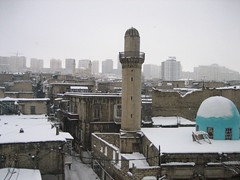ISLAMIC AND ETHNIC IDENTITIES IN AZERBAIJAN:
EMERGING TRENDS AND TENSIONS
EMERGING TRENDS AND TENSIONS
By Hema Kotecha
Development Researcher - Anthropologist
Development Researcher - Anthropologist
A Discussion Paper
Casually I discovered follow text in the internet. Hema Kotecha is also a interesting photographer. However that is clear for me. I know some anthropologist and all this persons have a good point fo view for take pictures !
View:
Azerbaijan 89 photos
South Caucasus BW 10 photos
Georgia 13 photos
FOREWORD
With the fulfilment of Azerbaijan's aspirations for economic viability into the future, through the completion of the Baku-Tbilisi-Ceyhan oil conduit, it is understandable that other primary factors in maintaining its stability may have been relegated to a level of peripheral concern.
 The county's geographical location, at the meeting point of the political and cultural blocs of Asia, Europe and the Middle East continues to impact heavily as it emerges from its recent Soviet past to redefine its identity. Cultural groups, hitherto largely subsumed into the single Soviet identity, can once again proclaim themselves; political diversity can be fostered.
The county's geographical location, at the meeting point of the political and cultural blocs of Asia, Europe and the Middle East continues to impact heavily as it emerges from its recent Soviet past to redefine its identity. Cultural groups, hitherto largely subsumed into the single Soviet identity, can once again proclaim themselves; political diversity can be fostered. However, this historically volatile region is burdened by unresolved conflicts which render it vulnerable to wider global issues of security and the potential for Azerbaijan to again fall victim to others’ desire for political influence remains as great now as it has ever been. Moreover, its stability, borne of mineral wealth, may become an irresistible lure to the burgeoning ranks of global terrorism and it is this latter concern which has prompted the OSCE Office to seek to discover the nature of possible vulnerabilities in the community.
The researcher, Hema Kotecha, has sought to do no more than to present her findings logically, in the context in which they were recorded, providing explanations to aid the reader where appropriate, but allowing the reader the freedom to draw conclusions. It should be emphasised that the work reflects the views and perceptions of people in Azerbaijan and these may not always align with reality or historical fact. Nonetheless, they do represent firm reality to those holding them and, as such, provide both a valuable insight into the huge cultural diversity which is Azerbaijan and suggest areas which may be vulnerable to exploitation.
The Office is grateful for the considerable time and dedication the author has devoted to this project and trust it will be of both interest and value to those who will read and make use of it.
OSCE Office in Baku
July 2006











No comments:
Post a Comment